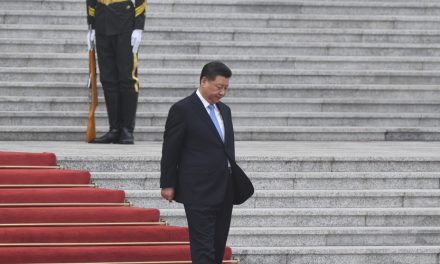By Bradley A. Thayer & Lianchao Han
 While the coronavirus consumes the headlines, when we consider how China’s leader handled the crisis, we can see larger pattern of behavior that reveals a consistent pattern of failure, whether in trade negotiations, decreased economic growth even before the COVID-19 outbreak, the global attention centered on the Muslim “re-education camps” in Xinjiang, to the suppression of democracy in Hong Kong and violation of its treaty commitments to the U.K. 2019 was a year of major failures for Xi’s CCP.
While the coronavirus consumes the headlines, when we consider how China’s leader handled the crisis, we can see larger pattern of behavior that reveals a consistent pattern of failure, whether in trade negotiations, decreased economic growth even before the COVID-19 outbreak, the global attention centered on the Muslim “re-education camps” in Xinjiang, to the suppression of democracy in Hong Kong and violation of its treaty commitments to the U.K. 2019 was a year of major failures for Xi’s CCP.
The result of this cumulative failures is that Xi’s leadership is maladroit for the Chinese Communist Party and too reckless for China and the world. While these failures reflect poorly on Xi’s rule, the miscarriages have two consequences for China’s relationship with the rest of the world.
First, the failures are going to derail the image Xi’s China seeks to convey to the Chinese people and to the world. The CCP under Xi has launched an ideological assault on the rest of the world via the “China Dream” strategic narrative. This is Xi’s attempt to move China toward a confident and greatly elevated position can be seen in Xi’s statements on the “China Dream,” particularly its emphasis on “the great rejuvenation of the Chinese nation” and developing “socialism with Chinese characteristics.” The core of Xi’s message is the belief that the Chinese model of global governance is superior to the status quo established by the West, particularly the Anglo-Americans at the end of World War II and in its aftermath. Xi suggested that China is the only country that can usher in this new world order. “Rejuvenation” implies the return to a status quo ante, which, it is reasonable to suspect, is Chinese domination. According to Xi, this “new era” that the “China Dream” describes is characterized by “Chinese wisdom and a Chinese approach to solving the problems facing mankind.”
In his elaboration of the “China Dream,” Xi often speaks of the need for “taking our own path,” which implies a break with the Western world order and the U.S. position in international politics. In actuality, this is a sustained effort to restore China’s past glory when it was the dominant force in the world. Xi has created the foundation for China’s takeover of the global economic order. His approach combines new narratives (“China Dream”), policies, institutions (such as the Asian Infrastructure Investment Bank, AIIB), and massive projects (e.g., Belt and Road Initiative, BRI) with the central objective of reconstituting the liberal world order, with new global governance ideas, concepts, and institutions that mask China’s power and hegemonic ambitions.
The “China Dream” rhetoric has been augmented by the “Common Destiny of Mankind” strategic narrative. It is understood, of course, at least in Beijing that China would naturally lead the implementation of this destiny as, by definition, no other state could. The strategic narrative cannot prevent balancing against China, of course, as that is caused by the prodigious growth of its capabilities and its malign ideology and grand strategic ambitions. However, the CDM strategic narrative allows China some concealment to advance its interests under the guise of its altruistic leadership to forge a happy world to come.
These narratives lie in ruins now due to his misrule. The string of failures is no accident but is rather the result of the inherent flaws of the one-party rule and Xi’s missteps as the head of the CCP. Any pretense that China possessed toward supplanting the global order legitimately has evaporated as these events reveal the true nature of the regime and Xi’s megalomaniacal rule. China may indeed replace the Western order, but if this were come to pass, the replacement of Western order will be illegitimate and mark a return to atavistic ideas and political principles.
Second, this opens an opportunity for the United States to explain to the world the costs of Xi’s misrule. These seriatim failures reveal the profound flaws of Xi’s rule. Moreover, they provide another opportunity to draw the stark contrast between the U.S. and China regarding the differences in their political principles, respect for freedoms and rights, how they govern, the consequences of their rule, and the vision each has of the future of international politics. In the realm of international politics, the consequences of COVID-19 should be sharply negative for China’s aspirations and diplomacy as the world is forced to address the result of Xi’s misrule. The world’s accounting will be measured in the deaths and sickness of their citizens and in the damage to the global economy.
Fundamentally, the pandemic is only the latest in a list of horrors that China has inflicted on itself and the world, and which, in turn, have dispelled the myth of the “China Dream” and “China model.” The “China Dream” and “China model” were anchored in the chimera of an efficient CCP, well suited to address every difficulty, and was intended to demonstrate in comparison to the West, China’s ascendency and supremacy over Western constitutional democracy. The world needed reminding that China’s political principles are as deadly as the pandemic their misrule permitted.
This article first appeared in RealClearDefense on
March 06, 2020



















